- Home
- Max Brooks
World War Z Page 9
World War Z Read online
Page 9
Blood was trickling down the gouge in Arkady’s fist. He shook it at the sky, screaming as the veins in his neck began to bulge. “We want to go home!” he bellowed. “We want to protect our families!” Others in the crowd began to pick it up. “Yes! We want to protect our families! This is a free country! This is a democracy! You can’t keep us in prison!” I was shouting, too, chanting with the rest. That old woman, the creature that could take a knife in the heart without dying… what it they were back home? What if they were threatening our loved ones … my parents? All the fear, all the doubt, every tangled, negative emotion all fused into rage. “We want to go home! We want to go home!” Chanting, chanting, and then … A round cracked past my ear and Arkady’s left eye imploded. I don’t remember running, or inhaling the tear gas. I don’t remember when the Spetznaz commandos appeared, but suddenly they were all around us, beating us down, shackling us together, one of them stepping on my chest so hard I thought I was going to die right then and there.
Was that the Decimation?
No, that was the beginning. We weren’t the first army unit to rebel. It had actually started about the time the MPs first closed down the base. About the time we staged our little “demonstration,” the government had decided how to restore order.
[She straightens her uniform, composes herself before speaking.]
To “decimate” … I used to think it meant just to wipe out, cause horrible damage, destroy … it actually means to kill by a percentage of ten, one out of every ten must die… and that’s exactly what they did to us.
The Spetznaz had us assemble on the parade ground, full dress uniform no less. Our new commanding officer gave a speech about duty — and responsibility, about our sworn oath to protect the motherland, and how we had betrayed that oath with our selfish treachery and individual cowardice. I’d never heard words like that before. “Duty?” “Responsibility?” Russia, my Russia, was nothing but an apolitical mess. We lived in chaos and corruption, we were just trying to get through the day. Even the army was no bastion of patriotism; it was a place to learn a trade, get food and a bed, and maybe even a little money to send home when the government decided it was convenient to pay its soldiers. “Oath to protect the motherland?” Those weren’t the words of my generation. That was what you’d hear from old Great Patriotic War veterans, the kind of broken, demented geezers who used to besiege Red Square with their tattered Soviet banners and their rows and rows of medals pinned to their faded, moth-eaten uniforms. Duty to the motherland was a joke. But I wasn’t laughing. I knew the executions were coming. The armed men surrounding us, the men in the guard towers, I was ready, every muscle in my body was tensing for the shot. And then I heard those words…
“You spoiled children think democracy is a God-given right. You expect it, you demand it! Well, now you’re going to get your chance to practice it.”
His exact words, stamped behind my eyelids for the rest of my life.
What did he mean?
We would be the ones to decide who would be punished. Broken up into groups of ten, we would have to vote on which one of us was going to be executed. And then we… the soldiers, we would be the ones to personally murder our friends. They rolled these little pushcarts past us. I can still hear their creaking wheels. They were full of stones, about the size of your hand, sharp and heavy Some cried out, pleaded with us, begged like children. Some, like Baburin, simply knelt there silently, on this knees, staring right into my face as I brought the rock down into his.
[She sighs softly, glancing over her shoulder at the one-way glass.]
Brilliance. Sheer fucking brilliance. Conventional executions might have reinforced discipline, might have restored order from the top down, but by making us all accomplices, they held us together not just by fear, but by guilt as well. We could have said no, could have refused and been shot ourselves, but we didn’t. We went right along with it. We all made a conscious choice and because that choice carried such a high price, I don’t think anyone ever wanted to make another one again. We relinquished our freedom that day, and we were more than happy to see it go. From that moment on we lived in true freedom, the freedom to point to someone else and say “They told me to do it! It’s their fault, not mine.” The freedom, God help us, to say “I was only following orders.”
Bridgetown, Barbados, West Indies Federation
[Trevor’s Bai personifies the “Wild West Indies,” or, more specifically, each island’s “Special Economic Zone.” This is not a place most people would associate with the order and tranquility of postwar Caribbean life. It is not meant to be. Fenced off from the rest of the island and catering to a culture of chaotic violence and debauchery, the Special Economic Zones are engineered specifically to separate “off-islanders” from their money. My discomfort seems to please T. Sean Collins. The giant Texan slides a shot of “kill-devil” rum in my direction, then swings his massive, boot-clad feet onto the table.]
They haven’t come up with a name for what I used to do. Not a real one, not yet. “Independent contractor” sounds like I should be layin’ dry-wall and smearin’ plaster. “Private security” sounds like some dumbass mall guard. “Mercenary” is the closest, I guess, but at the same time, about as far from the real me as you could have gotten. A mercenary sounds like some crazed-out ’Nam vet, all tats and handlestache, humpin’ in some Third World cesspool ’cause he can’t hack it back in the real world. That wasn’t me at all. Yeah, I was a vet, and yeah, I used my training for cash… funny thing about the army, they always promise to teach you “marketable skills,” but they never mention that, by far, there’s nothing more marketable than knowing how to kill some people while keeping others from being killed.
Maybe I was a mercenary, but you’d never know it to look at me. I was clean-cut, nice car, nice house, even a housekeeper who came in once a week. I had plenty of friends, marriage prospects, and my handicap at the country club was almost as good as the pros. Most importantly, I worked for a company no different from any other before the war. There was no cloak and dagger, no back rooms and midnight envelopes. I had vacation days and sick days, full medical and a sweet dental package. I paid my taxes, too much; I paid into my IRA. I could have worked overseas; Lord knows there was plenty of demand, but after seeing what my buddies went through in the last brushfire, I said, screw it, let me guard some fat CEO or worthless, dumb celebrity. And that’s where I found myself when the Panic hit.
You don’t mind if I don’t mention any names, ’kay? Some of these people are still alive, or their estates are still active, and… can you believe, they’re still threatening to sue. After all that’s gone down? Okay, so I can’t name names or places, but figure it’s an island … a big island … a long island, right next to Manhattan. Can’t sue me for that, right?
My client, I’m not sure what he really did. Something in entertainment, or high finance. Beats me. I think he might have even been one of the senior shareholders in my firm. Whatever, he had bucks, lived in this amazing pad by the beach.
Our client liked to know people who were known by all. His plan was to provide safety for those who could raise his image during and after the war, playing Moses to the scared and famous. And you know what, they fell for it. The actors, and singers, and rappers and pro athletes, and just the professional faces, like the ones you see on talk shows or reality shows, or even that little rich, spoiled, tired-looking whore who was famous for just being a rich, spoiled, tired-looking whore.
There was that record mogul guy with the big ’ole diamond earrings. He had this tricked-out AK with a grenade launcher. He loved to talk about how it was an exact replica of the one from Scarface. I didn’t have the heart to tell him that Senor Montana had used a sixteen A-l.
There was the political comedy guy, you know, the one with the show. He was snorting blow between the air bags of this teeny Thai stripper while spewing about how what was happening wasn’t just about the living versus the dead, it would send shock waves throu
gh every facet of our society: social, economic, political, even environmental. He said that, subconsciously, everyone already knew the truth during the “Great Denial,” and that’s why they wigged out so hard when the story was finally broken. It all actually kinda made sense, until he started spewing about high fructose corn syrup and the feminization of America.
Crazy, I know, but you kinda expected those people to be there, at least I did. What I didn’t expect was all their “people.” Every one of them, no matter who they were or what they did, had to have, at least, I don’t know-how many stylists and publicists and personal assistants. Some of them, I think, were pretty cool, just doing it for the money, or because they figured they’d be safe there. Young people just trying to get a leg up. Can’t fault them for that. Some of the others though… real pricks all high on the smell of their own piss. Just rude and pushy and ordering everyone else around. One guy sticks out in my mind, only because he wore this baseball cap that read “Get It Done!” I think he was the chief handler of the fat fuck who won that talent show. That guy must have had fourteen people around him! I remember thinking at first that it would be impossible to take care of all these people, but after my initial tour of the premises, I realized our boss had planned for everything.
He’d transformed his home into a survivalists’ wet dream. He had enough dehydrated food to keep an army fed for years, as well as an endless supply of water from a desalinizer that ran right out into the ocean. He had wind turbines, solar panels, and backup generators with giant fuel tanks buried right under the courtyard. He had enough security measures to hold off the living dead forever: high walls, motion sensors, and weapons, oh the weapons. Yeah, our boss had really done his homework, but what he was most proud of was the fact that every room in the house was wired for a simultaneous webcast that went out all over the world 24/7. This was the real reason for having all his “closest” and “best” friends over. He didn’t just want to ride out the storm in comfort and luxury, he wanted everyone to know he’d done it. That was the celebrity angle, his way of ensuring high-profile exposure.
Not only did you have a webcam in almost every room, but there was all the usual press you’d find on the Oscar’s red carpet. I honestly never knew how big an industry entertainment journalism was. There had to be dozens of them there from all these magazines and TV shows. “How are you feeling?” I heard that a lot. “How are you holding up?” “What do you think is going to happen?” and I swear I even heard someone ask “What are you wearing?”
For me, the most surreal moment was standing in the kitchen with some of the staff and other bodyguards, all of us watching the news that was showing, guess what, us! The cameras were literally in the other room, pointed at some of the “stars” as they sat on the couch watching another news channel. The feed was live from New York’s Upper East Side; the dead were coming right up Third Avenue, people were taking them on hand to hand, hammers and pipes, the manager of a Modell’s Sporting Goods was handing out all his baseball bats and shouting “Get ’em in the head!” There was this one guy on rollerblades. He had a hockey stick in his hand, a big ’ole meat cleaver bolted to the blade. He was doing an easy thirty, at that speed he might have taken a neck or two. The camera saw the whole thing, the rotted arm that shot out of the sewer drain right in front of him, the poor guy back flipping into the air, coming down hard on his face, then being dragged, screaming, by his ponytail into the drain. At that moment the camera in our living room swung back to catch the reactions of the watching celebs. There were a few gasps, some honest, some staged. I remember thinking I had less respect for the ones who tried to fake some tens than I did for the little spoiled whore who called the rollerblading guy a “dumbass.” Hey, at least she was being honest. I remember I was standing next to this guy, Sergei, a miserable, sad-faced, hulking motherfucker. His stories about growing up in Russia convinced me that not all Third World cesspools had to be tropical. It was when the camera was catching the reactions of the beautiful people that he mumbled something to himself in Russian. The only word I could make out was “Romanovs” and I was about to ask him what he meant when we all heard the alarm go off.
Something had triggered the pressure sensors we’d placed several miles around the wall. They were sensitive enough to detect just one zombie, now they were going crazy. Our radios were squawking: “Contact, contact, southwest corner … shit, there’s hundreds of them!” It was a damn big house, it took me a few minutes to get to my firing position. I didn’t understand why the lookout was so nervous. So what if there were a couple hundred. They’d never get over the wall. Then I heard him shout “They’re running! Holy fuckin’ shit, they’re fast!” Fast zombies, that turned my gut. If they could run, they could climb, if they could climb, maybe they could think, and if they could think… now I was scared. I remember our boss’s friends were all raiding the armory, racing around like extras in an ’80s ac-tion flick by the time I made the third-floor guestroom window.
I flipped the safety off my weapon and flipped the guards off my sight. It was one of the newest Gen’s, a fusion of light amplification and thermal imaging. I didn’t need the second part because Gs gave off no body heat. So when I saw the searing, bright green signatures of several hundred runners, my throat tightened. Those weren’t living dead.
“There it is!” I heard them shout. “That’s the house on the news!” They were carrying ladders, guns, babies. A couple of them had these heavy satchels strapped to their backs. They were booking it for the front gate, big tough steel that was supposed to stop a thousand ghouls. The explosion tore them right off their hinges, sent them flipping into the house like giant ninja stars. “Fire!” the boss was screaming into the radio. “Knock ’em down! Kill ’em! Shootshootshoot!”
The “attackers,” for lack of a better label, stampeded for the house. The courtyard was full of parked vehicles, sports cars and Hummers, and even a monster truck belonging to some NFL cat. Freakin fireballs, all of them, blowing over on their sides or just burning in place, this thick oily smoke from their tires blinding and choking everyone. All you could hear was gunfire, ours and theirs, and not just our private security team. Any big shot who wasn’t crapping his pants either had it in his head to be a hero, or that he had to protect his rep in front of his peeps. A lot of them demanded that their entourage protect them. Some did, these poor twenty-year-old personal assistants who’d never fired a gun in their lives. They didn’t last very long. But then there were also the peons who turned and joined the attackers. I saw this one real queeny hairdresser stab an actress in the mouth with a letter opener, and, ironically, I watched Mister “Get It Done” try to wrestle a grenade away from the talent show guy before it went off in their hands.
It was bedlam, exactly what you thought the end of the world was supposed to look like. Part of the house was burning, blood everywhere, bodies or bits of them spewed over all that expensive stuff. I met the whore’s rat dog as we were both heading for the back door. He looked at me, I looked at him. If it’d been a conversation, it probably woulda gone like, “What about your master?” “What about yours?” “Fuck ’em.” That was the attitude among a lot of the hired guns, the reason I hadn’t fired a shot all night. We’d been paid to protect rich people from zombies, not against other not-so-rich people who just wanted a safe place to hide. You could hear them shouting as they charged in through the front door. Not “grab the booze” or “rape the bitches”; it was “put out the fire!” and “get the women and kids upstairs!”
I stepped over Mister Political Comedy Guy on my way out to the beach. He and this chick, this leathery old blonde who I thought was supposed to be his political enemy, were goin’ at it like there was no tomorrow, and, hey, maybe for them, there wasn’t. I made it out to the sand, found a surfboard, probably worth more than the house I grew up in, and started paddling for the lights on the horizon. There were a lot of boats on the water that night, a lot of people gettin’ outta Dodge. I hoped one of them mi
ght give me a ride as far as New York Harbor. Hopefully I could bribe them with a pair of diamond earrings.
[He finishes his shot of rum and signals for another.]
Sometimes I ask myself, why didn’t they all just shut the fuck up, you know? Not just my boss, but all of those pampered parasites. They had the means to stay way outta harm’s way, so why didn’t they use it; go to Antarctica or Greenland or just stay where they were but stay the hell outta the public eye’ But then again, maybe they couldn’t, like a switch you just can’t turn off. Maybe it’s what made them who they were in the first place. But what the hell do I know’
[The waiter arrives with another shot and T. Sean flicks a silver rand coin to him.]
“If you got it, flaunt it,”
Ice City, Greenland
[From the surface, all that is visible are the funnels, the massive, carefully sculpted wind catchers that continue to bring fresh, albeit cold, air to the three-hundred-kilometer maze below. Few of the quarter million people who once inhabited this hand-carved marvel of engineering have remained. Some stay to encourage the small but growing tourist trade. Some are here as custodians, living on the pension that goes with UNESCO’s renewed World Heritage Program. Some, like Ahmed Farahnakian, formerly Major Farahnakian of the Iranian Revolution Guards Corps Air Force, have nowhere else to go.]
India and Pakistan. Like North and South Korea or NATO and the old Warsaw Pact. If two sides were going to use nuclear weapons against each other, it had to be India and Pakistan. Everyone knew it, everyone expected it, and that is exactly why it didn’t happen. Because the danger was so omnipresent, all the machinery had been put in place over the years to avoid it. The hotline between the two capitals was in place, ambassadors were on a first-name basis, and generals, politicians, and everyone involved in the process was trained to make sure the day they all feared never came. No one could have imagined-I certainly didn’t-that events would unfold as they did.

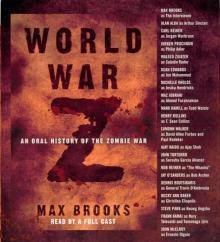 World War Z: An Oral History of the Zombie War
World War Z: An Oral History of the Zombie War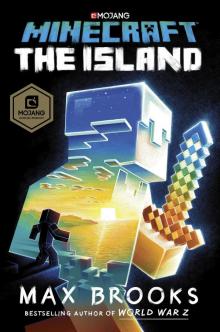 Minecraft: The Island
Minecraft: The Island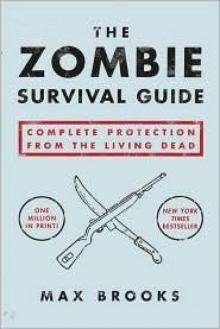 The Zombie Survival Guide: Complete Protection From the Living Dead
The Zombie Survival Guide: Complete Protection From the Living Dead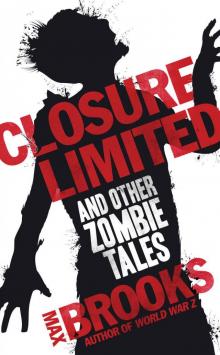 Closure, Limited and Other Zombie Stories
Closure, Limited and Other Zombie Stories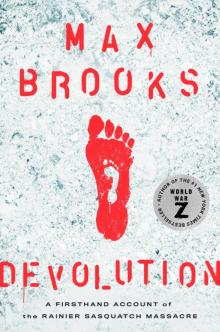 Devolution: A Firsthand Account of the Rainier Sasquatch Massacre
Devolution: A Firsthand Account of the Rainier Sasquatch Massacre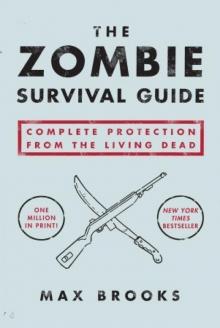 The Zombie Survival Guide
The Zombie Survival Guide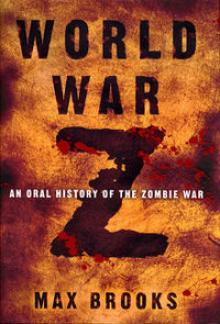 World War Z
World War Z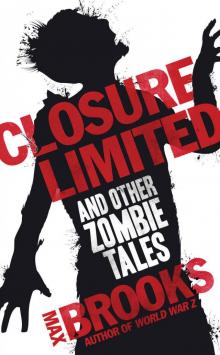 Closure, Limited
Closure, Limited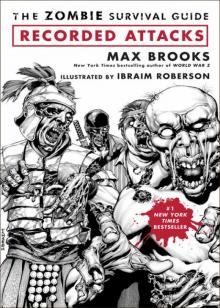 The Zombie Survival Guide: Recorded Attacks
The Zombie Survival Guide: Recorded Attacks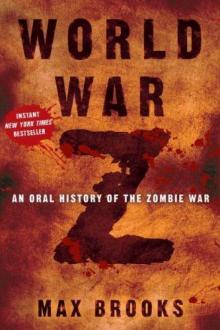 World War Z_An Oral History of the Zombie War
World War Z_An Oral History of the Zombie War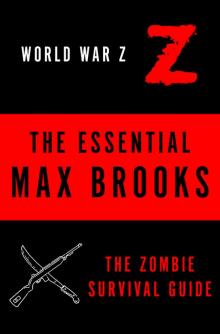 The Essential Max Brooks: The Zombie Survival Guide and World War Z
The Essential Max Brooks: The Zombie Survival Guide and World War Z